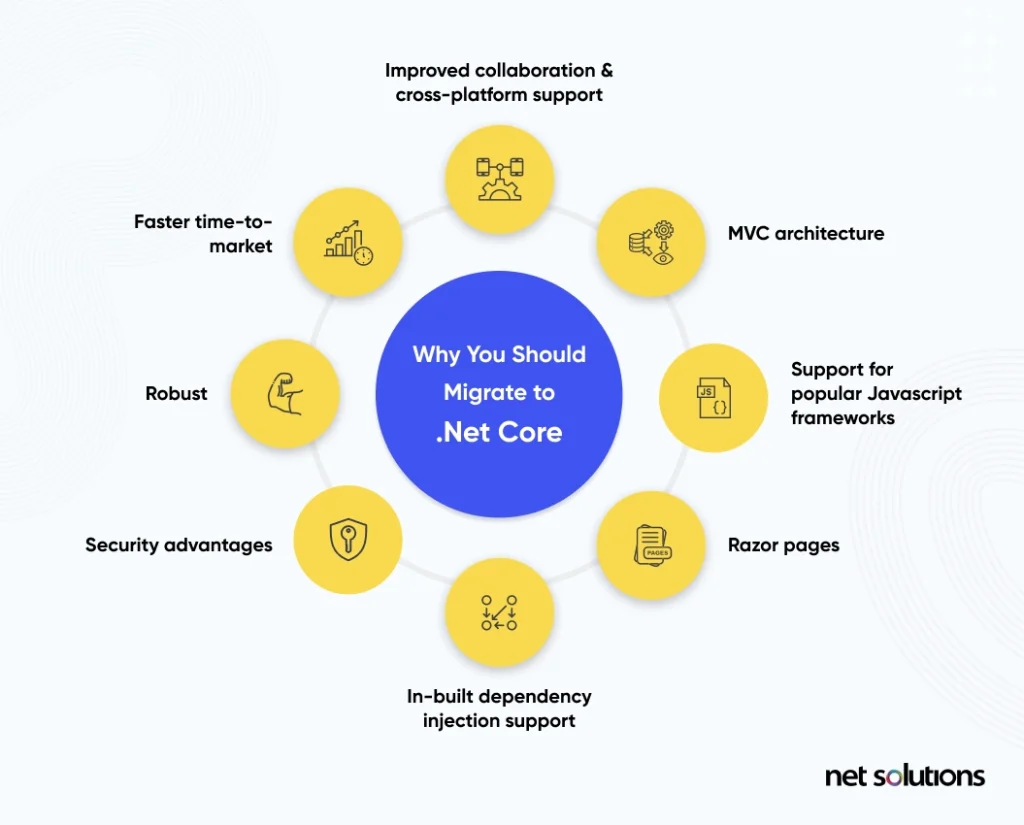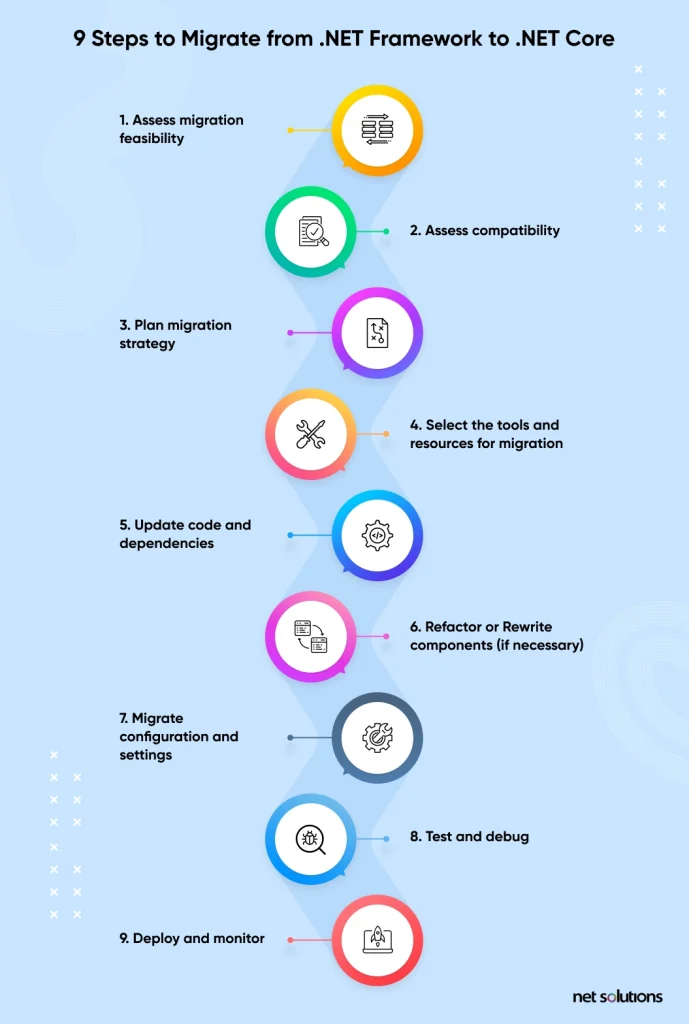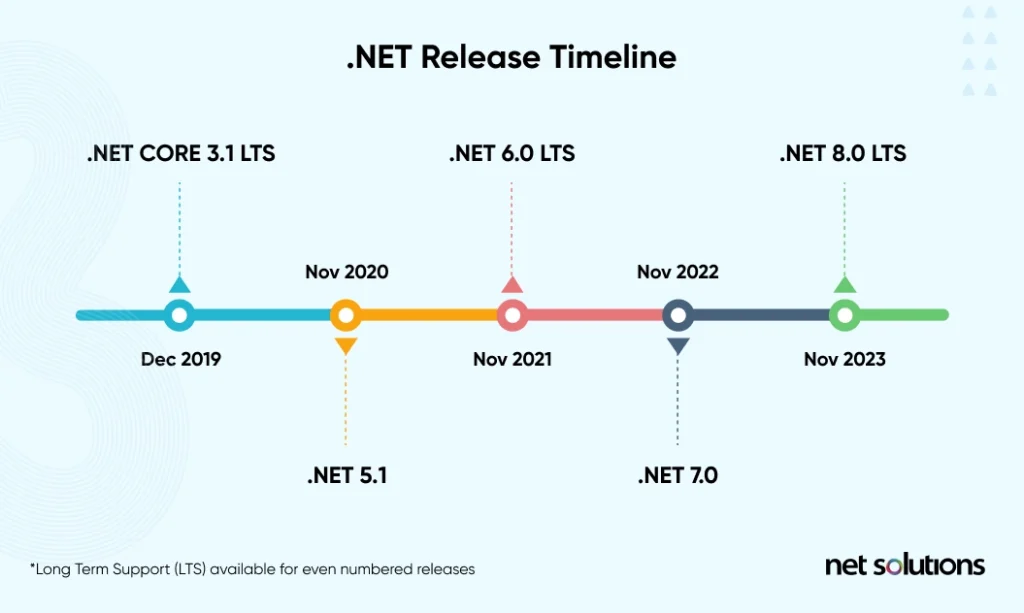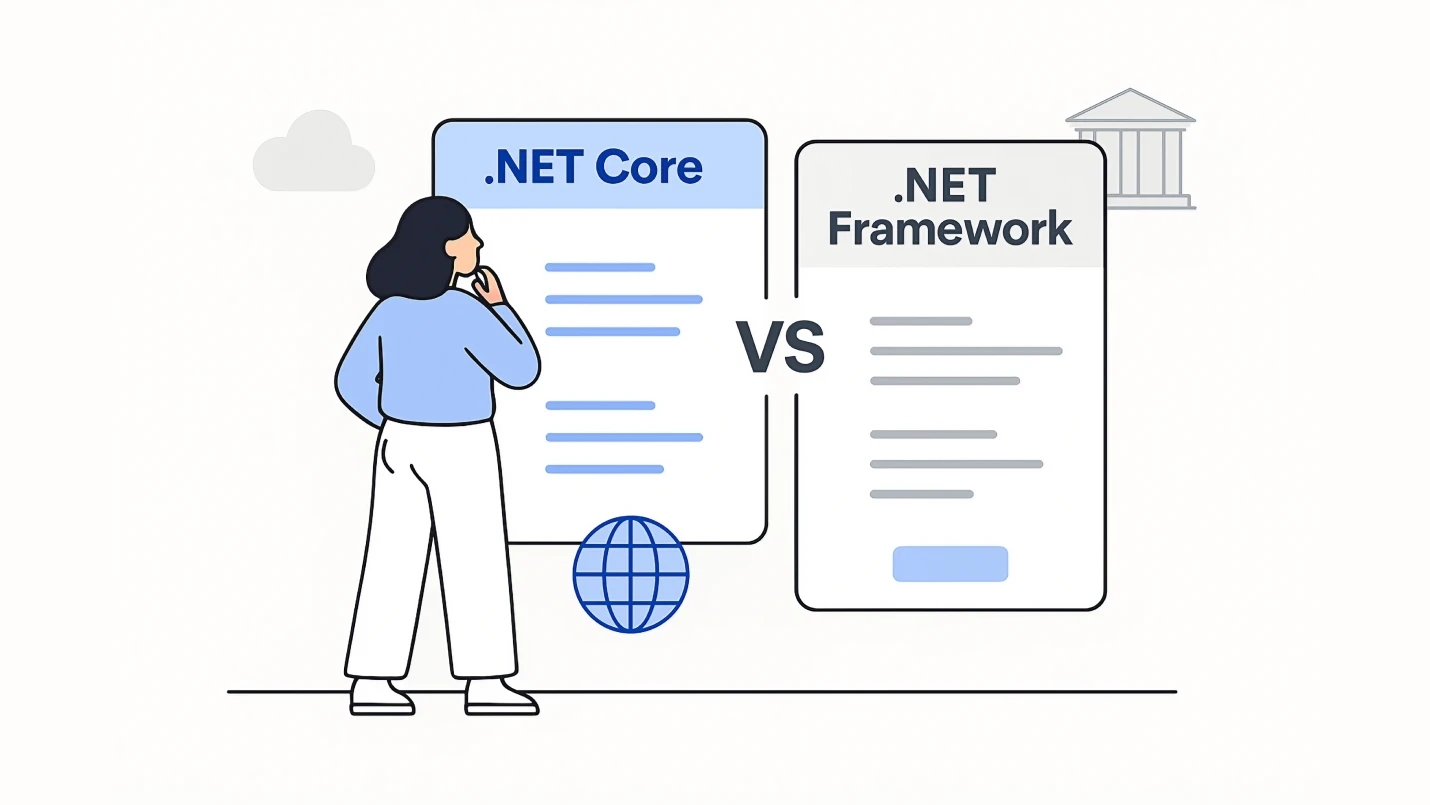In the ever-evolving landscape of technology, businesses must stay ahead by upgrading their systems to align with their digital transformation goals. When choosing the proper framework for your business applications, Microsoft offers two prominent options – .NET Core and .NET Framework.
.NET Framework and .NET Core
The .NET framework was the first software framework introduced by Microsoft, and it was built only for Windows. .NET Core is a newer version of the .NET domain that addresses the limitations of the .NET Framework. According to the StackOverflow 2021 developer survey, .NET and .NET Core remain the most commonly used software development frameworks. While the .NET Framework represents the traditional and time-tested version, .NET Core has emerged as a modern counterpart designed to address its limitations and embrace the latest technological advancements.
.NET Core is a cross-platform framework for Windows, macOS, and Linux. It is open-source and accepts contributions from the developer community. Understanding the differences between .NET Framework and .NET Core, you will uncover how .NET Core offers a flexible, scalable, and future-ready approach to application development. Enterprises are now better suited to migrate from .NET Framework to .NET Core. Let’s first understand the “why” behind that.
Why must you migrate from .Net Framework to .Net Core?
.NET Core is a cross-platform framework, so you can use it to build apps that run on Windows, macOS, and Linux. .NET Core is also a modular framework, meaning you can only include the features you need in your app. This can make your app smaller and faster.
You should migrate to a new framework for:
- Better performance and scalability
- Increased security and compliance
- New features and functionality
- A more modern development experience
- To future-proof your applications

Here’s a comparative sum-up to show why you .NET Core should be the ideal choice for enterprises:
| Compatibility | Windows | Windows, macOS, Linux |
| Deployment | The web application must be deployed only on the Internet Information Server. | It has a flexible deployment model. .NET Core’s advantage over .NET Framework lies in the fact that it can be hosted in multiple ways, making it more flexible. |
| Focus on Devices | .NET Framework is limited only to Windows OS. | .NET Core includes an integrated platform for developing applications for the cloud, IoT, AI, and mobile. |
| Source | .NET Framework is proprietary and released under the Microsoft Reference Source License | Open Source |
| Support for microservices and REST services | It gets support from WCF and also supports REST services, but does not support the creation or deployment of microservices and is less effective in terms of performance. | Suitable for modern cloud-native and cross-platform applications due to its lightweight nature, improved performance, and better support for containerization. It is recommended to use .NET Core for new projects. |
| Security | .NET Framework has a larger surface area due to its long history and extensive libraries. This may increase the potential attack surface. | Excellent security features. It has some advantages due to its smaller surface area, cross-platform compatibility, and containerization support. |
| Mobile development | As a Windows-only framework, the .NET Framework does not support mobile development, making this framework very inflexible for the needs of today’s applications. | Supports Android, iOS, and macOS applications. It supports mobile apps, particularly given the shared connection/compatibility with Xamarin and other open-source platforms. |
.NET Core is an excellent choice, especially when you:
- Want to target your apps in a wider variety of operating systems (“create once, run anywhere” cross-platform capability)
- Require high performance and/or scalability
- Are just learning .NET
- Prefer open-source
- Are using Docker containers and/or microservices architecture
- If you require side-by-side .NET versions per application
9 Steps to Migrating from .NET Framework to .NET Core
If you are considering migrating from .NET Framework to .NET Core, you must assess your current app and decide if it is a good candidate for migration. The migration process should be relatively straightforward if your app does not use any features not supported in .NET Core. You must make some code changes if your app uses features not supported in .NET Core. Several resources are available to help you with the migration process. Here are the key steps to migrating from .NET Framework to .NET Core
1. Assess migration feasibility
Before initiating a migration, it’s crucial to assess the feasibility of the transition by evaluating the complexity and scope of your existing application. Consider factors such as the codebase size, dependencies on specific Windows features, and compatibility of third-party libraries.
2. Assess compatibility
Evaluate the existing .NET Framework application to identify compatibility issues, dependencies, and potential challenges for migration.
3. Plan migration strategy
Develop a comprehensive plan outlining the approach, timeline, and resources required for the migration process. Create an extensive migration plan outlining the steps, timelines, and potential risks. Begin with smaller components or modules and gradually migrate to the entire application.
4. Select the tools and resources for migration
Several tools and resources are available to aid in migration. Microsoft provides the .NET Portability Analyzer to assess compatibility with .NET Core. The documentation and guides provided by Microsoft and the community can offer valuable insights and guidance for a successful migration. Leverage available resources and community support to address challenges and seek advice during migration.
5. Update code and dependencies
Modify the codebase to make it compatible with .NET Core, ensuring that any dependencies are updated to their .NET Core equivalents. Update or replace any dependencies or third-party libraries incompatible with the target framework.
6. Refactor or Rewrite components (if necessary)
If specific components are not directly compatible, consider refactoring or rewriting them to align with the .NET Core architecture. Refactor and optimize code where necessary to align with the best practices and patterns of the target framework.
7. Migrate configuration and settings
Migrate application settings, configuration files, and environment-specific configurations to the corresponding .NET Core equivalents.
8. Test and debug
Thoroughly test the migrated application to identify and resolve any issues or bugs that may have emerged during the migration process. Conduct thorough testing and quality assurance to identify and resolve compatibility or performance issues.
9. Deploy and monitor
Deploy the migrated application to the target environment and monitor its performance to ensure it functions correctly in the new framework.

.NET 8 – The Next Step on the Microsoft Roadmap
In November 2020, Microsoft released .NET 5.0, dropping the “Core” branding. The most recent version, .NET 7.0, was released in November 2022. .NET Core 8.0 will be released in November 2023, with improvements in code generation and better performance.
.NET 8 is the upcoming major release in the .NET Core family. It will bring improvements to the C# language and runtime performance. It will continue to support cross-platform development. .NET 8 supports LTS and will also focus on modern application development practices like containerization and microservices. It will integrate with other Microsoft technologies and embrace open-source development. Stay tuned for official announcements from Microsoft for more details and the release timeline.
Choosing .NET for building applications is one crucial decision. Initially, the default .NET Framework was the only option, but with the advent of .NET Core, application development has seen an upswing. The .NET Framework vs. .NET Core discussion remains alive and well because both options are fantastic – for the right project.

How Can Net Solutions Help?
Net Solutions is a team of experienced .NET developers with over 20 years of experience. We have worked on various projects in various domains, including healthcare, coaching, underground mining, IoT, and cloud kitchens. We have a strong track record of success and can help you with your next .NET project.
We are a prominent ASP.Net development company that leverages Microsoft Azure and the .Net framework to transform businesses into cloud computing powerhouses.
We offer services to design, build, and manage Azure cloud computing projects, focusing on enhancing employee collaboration, facilitating remote work, ensuring computer backups, and managing devices.
Our experienced .Net developers have worked on projects like Frontrush, providing tailored solutions for various business challenges. By developing cloud-first software solutions, Net Solutions enables businesses to enhance their flexibility, responsiveness to market demands, and ability to meet customer expectations.
IMG and its Successful Journey with Net Solutions
Net Solutions helped IMG, a global leader in sports, events, media, and fashion, develop a web application to automate the merchandise approval and licensing processes with vendors. IMG wanted a B2B web app compatible with all operating systems and devices.
We relied on .NET Core for developing a web application with SQL Server for the backend, and we worked on developing the front end using JavaScript, JQuery, HTML, and CSS.
The result – IMG was able to roll out an internal application that helped its staff become more efficient with their vendors. This feature, in turn, brought transparency throughout licensing and approvals. Read more here.
Frequently Asked Questions
You can run existing .NET Framework applications on .NET Core using “porting” or “re-targeting.”.NET Core provides a tool called the “.NET Portability Analyzer” that helps assess the compatibility of your codebase with .NET Core. Not all applications can be directly ported without modifications. The feasibility of running an existing .NET Framework application on .NET Core depends on various factors such as the dependencies, compatibility of third-party libraries, and usage of Windows-specific features. You may need to modify your code and update any dependencies or libraries incompatible with .NET Core.
Microsoft follows a “Long-Term Support (LTS)” policy for .NET Core releases, providing three years of support for each LTS version. This includes security updates and bug fixes. Planning your application’s lifecycle around the LTS versions is essential to ensure long-term support. .NET Framework is a mature framework with a well-established support lifecycle. Microsoft provides extended support for each version, including security updates and technical support.
.NET Core can be deployed as a self-contained application with all dependencies included or as a framework-dependent application that relies on the presence of .NET Core runtime on the target machine. Deployment of .NET Framework applications typically requires installing the framework on the target machine. This dependency on the framework may introduce additional considerations for managing and updating the framework on the target systems.
.NET Core has been designed to have a more modular and open approach, making integrating different technologies and frameworks easier. .NET Framework has a larger library ecosystem and established integrations with various Microsoft technologies. It’s essential to thoroughly research and evaluate other frameworks’ compatibility and integration options with the technologies you plan to use. Assessing the framework’s ecosystem, community support, and available integrations will help determine the feasibility and ease of integration with other technologies in your specific use case.






